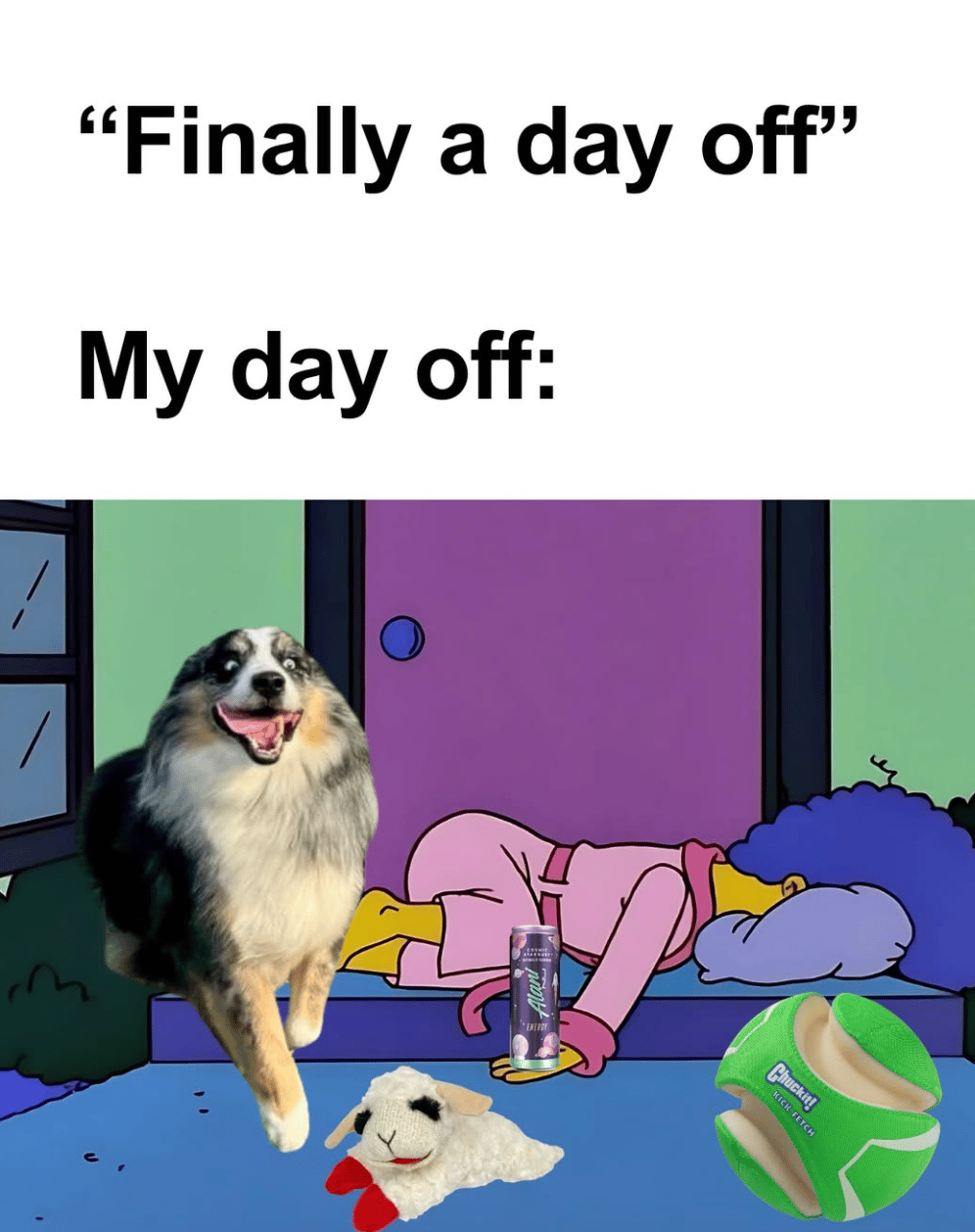Your daily dose of doggy goodness!
Every day, we celebrate our shared love of dogs and hopefully brighten your day. Enjoy!
Dog of the Day:
Kahlua!

Meme of the day: What’s a day off?!

The Great Car Slobber Mystery: Why Our Dogs Become Drool Fountains on Four Wheels
Every dog owner knows the ritual: you open the car door, your furry friend leaps in with excitement, and within minutes, the back seat is a scene of utter, watery chaos. Yes, we're talking about the astonishing amount of drool our dogs can produce during a car ride. It's an endearing, if a bit messy, mystery. So, why exactly do our beloved companions turn into veritable slobber fountains once the engine starts?
The answer, as is often the case with our canine friends, is a mix of simple physiology and deep emotion.

Motion Sickness: The Queasy Cause
This is perhaps the most common culprit. Just like humans, dogs can experience motion sickness or carsickness. When the movement of the vehicle confuses their inner ear's balance system, it can trigger feelings of dizziness and nausea.
Excessive drooling is one of the first physical signs of a dog feeling nauseous. It's an involuntary reflex: the body produces extra saliva in an attempt to protect the stomach and esophagus lining in preparation for potential vomiting. If you notice the drooling is accompanied by lip-licking, excessive panting, whining, or lethargy, it's a strong sign that your pup is feeling queasy.
The Power of Emotion: Anxiety and Excitement
Our dogs are creatures of powerful feelings, and both positive and negative emotions can unleash the drool.
Anxiety and Fear: If your dog associates the car ride with a negative destination (like a trip to the vet for shots or a groomer they don't love), the anxiety can start the moment they step into the vehicle. This stress response—much like a human sweating or having a racing heart—can trigger excessive salivation. For these dogs, the drooling often starts before the car even moves!
Pure Excitement: On the flip side, some dogs just love the car because they know it leads to the park, the beach, or a fun visit with Grandma. This anticipation and sheer joy can ramp up their salivary glands into overdrive. It's the equivalent of a human drooling when smelling a favourite meal—but magnified!
The Heat is On: Overheating
Dogs don't sweat like we do; their primary way to cool down is by panting. If the car is too warm, or your dog is a brachycephalic (flat-faced) breed like a Pug or Bulldog, they may be panting heavily to regulate their temperature. This heavy panting leads to increased saliva production, and thus, more drool. Always ensure your car is cool and well-ventilated for your furry passenger.
How to Help Your Soggy Companion
Understanding the "why" is the first step to a drier, happier ride. If your dog is a frequent car drooler, here are a few ways to help:
For Motion Sickness: Try restricting food for a few hours before a trip. Your veterinarian can also recommend safe anti-nausea medications specifically for dogs. Opening a window a few inches to equalize air pressure can sometimes help, too.
For Anxiety: Desensitization is key. Start with short, positive experiences: just sitting in the parked car, then short drives to fun places, not just the vet. Treats and praise can help recondition their feelings about car travel.
Safety First: Always use a dog seat belt, harness, or secure crate. A safe, enclosed space can make many dogs feel less anxious and more stable, helping to reduce both fear and motion sickness.
The next time you pull up to your destination and see the impressive pool of slobber, you can take a moment to appreciate the complex emotions and unique physiology of your wonderful dog. A quick cleanup and a reassuring hug are all that's needed to get back to enjoying the adventure!
Dog Food and Supplement Recalls
Here are the recent recalls and advisories:
Viva - Ground Beef for Dogs and Ground Chicken for Dogs and Cats for potential Salmonella and Listeria contamination.
Savage Pet - Cat Food Chicken for potential bird flu exposure.
Wild Coast Raw - Frozen Boneless Free-Range Chicken Formula raw pet food for cats, for possible bird flu exposure.
The Smile Section
Family Photo of the Day:
Echo!

We want to feature your pup!
We want to share your pup with our pack. Email us your favorite doggy pic or video with your pup’s name, and we'll try to feature it as a family photo in one of our upcoming newsletters or on our Facebook page.
Share our newsletter with your friends!
Meme of the day: @polotheminiaussie
